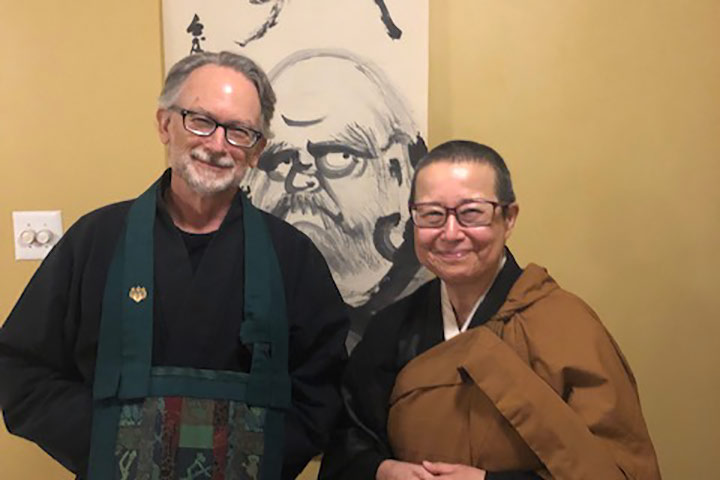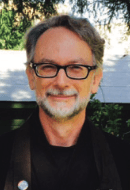
You Are My Teacher
January 1, 2022
 by Bill Earth-Mirror Corcoran
by Bill Earth-Mirror Corcoran
Huang Po, instructing the community, said, “All of you people are gobblers of dregs; if you go on traveling around this way, where will you have Today? Do you know that there are no teachers of Zen in all of China?”
At that time a monk came forward and said, “ Then what about those in various places who order followers and lead communities?”
Huang Po said, “I do not say that there is no Zen; it’s just that there are no teachers.”
Case 11 Huang Po’s Gobblers of Dregs from the Blue Cliff Record
The turning of the year brings turnings at Zen Center of Los Angeles. Our beloved teacher, Roshi Wendy Egyoku Nakao, to whom I bow in great gratitude, is transitioning from her role as Head Teacher to that of Senior Dharma Teacher and Roshi Sama, as we are affectionately calling her. Her long cultivation of the ZCLA field has brought forth teachers and students who will carry on the practice of Zen Buddhism here on Normandie Mountain.
It’s a fine time to reflect on the roles of teachers and students in this practice beyond words, this teaching of the unteachable. Huang Po’s rhetorical slapping down of our conventional ideas of teaching and being taught demands that we confront this relationship directly.
Huang Po, Obaku in Japanese, flourished in ninth century China and is in the third generation of masters descended from Hui Neng through the illustrious ancestors Mazu and Baizhang. He is said to have been seven feet tall and had a knot on his forehead from all his bowing. It’s reported that he wore a tiny hat, which he said the universe fit within.
Imagine you’re an itinerant monk in ninth century China. Travel is hard and dangerous. You’ve committed your life to the Way, contending with the pitfalls and vines that our busy minds create on the path. You’ve heard that this Huang Po is the real deal, that here is a teacher to clarify the Way. You finally make your way to the monastery and there you are, an earnest practitioner, in the hall with many other monks. The towering Huang Po fills the hall with an electric presence. And what do you hear?
“All of you people are gobblers of dregs; if you go on traveling around this way, where will you have Today? Do you know that there are no teachers of Zen in all of China?”
How would you take this? You could decide to be insulted – I’m no gobbler of dregs! – and leave in a huff. Or you might crumple into a ball of fear that all your short-comings that you think are a big problem have been caught out. But let’s set that reactivity aside and hope we might choose to be curious. What about these dregs? What words am I gobbling up? What spent bits do I energetically stuff myself with, dregs that have had their essence leached out of them? Why do I do this?
We do it all of the time and not just in this specific sense of gobbling up others’ words. How often do you doubt yourself, seek outside of yourself, replacing moment after moment with your ideas or other’s ideas about the moment? Grasping for the essence we think is outside of ourselves, the lively action of right now becomes dead dregs in our mouth.
Huang Po’s chastisement continues: “If you go on traveling around this way, where will you have Today?” If we are going from teacher to teacher, book to book, if we are going on pilgrimage, if we are coming to ZCLA regularly (one day we will again!), if we are doing any of this with the idea that we are not worthy, that we need expertise, that there is something we need to GAIN, then we are gobbling dregs – the wine’s essence is far away!
What about this “Today”? He isn’t talking about where we are on the calendar, he’s talking about you and me. He is saying Stop! Stop thinking that what you seek is outside of you! Stop thinking someone can give it to you! He’s saying, “Look, it’s right in front of you. It is things as they are. Just see it.” Not so easy!
Huang Po goes on to make sure he has thoroughly stolen away the idea of a teacher giving you anything, asking “Do you know that there are no teachers of Zen in all of China?” No teachers of Zen – this from the disciple of Baizhang/Hyakujo, from the teacher of Lin Chi, the founder of the Rinzai school! What’s this rascal up to?
A good teacher isn’t there to give you something, they are there to take something away. They’re like a blood- hound sniffing out what you are holding onto. In Zen literature, teachers are repeatedly called thieves because they steal away the things you think you need. The teacher is there to keep pointing out again and again what it is you are holding onto, what is putting a gauze between you and this life. Your life! A teacher doesn’t give you a thing, they only help you to take things away so you can taste the wine of your true life and never thirst again.
After Huang Po announces that there are no teachers of Zen, a monk gets up and asks the obvious question: “Then what about those in various places who order followers and lead communities?” In other words, okay, what about you, Huang Po, what are we doing here in this hall with you today?
He might have answered by chasing them all out of the hall with his staff, but he instead replies: “I do not say that there is no Zen; it’s just that there are no teachers.” This Zen he’s talking about is not the physical manifestations of practice; it’s the essential truth of reality. A teacher can’t give you a single bit of that. How could they ever give you yourself?
Even the idea of one person and another isn’t an immutable fact. Seen from one perspective there is no teacher and no student, from another there is teacher/student happening. Not a “teacher” over here and a “student” over there. Just like there isn’t a “tree” over here and a “bird” over there. There is bird/tree happening and there is teacher/student happening and that changes constantly. But in another perspective, yes, there is teacher and student, but it is never the case that the teacher is giving something that is missing from the student.
When the moment calls for it, the teacher may verify our alignment with our true nature, which is expressed as only we can individually express it. They may help catalyze our practice through trusting, open interactions that demand integrity from both people. They may let us bump around and be stuck as needed, or they may unsentimentally cut off our whining, our self-involvement, all of the ways we get lost in our wandering mind.
In his wonderful guide to Dogen Zenji’s “The Mountains and Waters Sutra,” Shohaku Okumura Roshi recalls that Uchiyama Roshi often said, “The teacher is not a caretaker or a babysitter.” He adds, “He never took care of his students; he just carried out his own practice wholeheartedly.”1 Isn’t that kind? In the end, the most you will ever learn from a teacher is to just be around them a lot and absorb the teaching of their presence.
It’s your steadfast faith in yourself and your capacity and your faith in another’s self and their capacity that form the sinews of how the teaching is transmitted. There is no way for teacher and student to play their roles, there is no way to bring forth the depths of our reality without this faith. Our learning together, our practice together is not a machine with inputs and outputs. It’s an alive arising together with all our messiness, all the things we think are bad, all the things we think are good – all the things! All the things are the teacher.
Our practice together is the heart of the sangha. It isn’t a charismatic teacher or a brilliant speaker or a focus on strict rigor for its own sake. Your practice, when it is genuine, when you care enough to keep digging and pressing and challenging yourself, that is the pearl, the practice of the Buddhas. The Venerable Taizan Maezumi Roshi says in the collection of his talks Appreciate Your Life, “Have trust in your life as the Way itself. Have trust in yourself as Shakyamuni Buddha himself. I want you to appreciate this. This is not a sophisticated teaching. Your life is ‘Shakyamuni Buddha and I are practicing together.’ Please have good trust in yourself.”
We must be careful not to impose our ideas about what a teacher should be and what a student should be. The relationship is one of the deepest mutual respect, each temporarily in a role, playing the most important game, which is to create the space together for life to come forward as freely and authentically as we can and to appreciate that as the full gift of the universe, the ground of our being together. Not me over here and you over there, not this one who knows and this one who doesn’t, but rather two people together in a dance that has gone on forever and will continue forever. And, of course, there are no people, no dance; no student, no teacher. If there are no teachers of Zen, there are no students of Zen. Then what?
You are my teacher; I am your teacher. We are all students. Let us bow to one another in that spirit. This is fundamental to our being in community, to being a sangha. In the end, it is our faith, commitment, and daring that allow the teaching to blossom and renew here on Normandie Mountain and in all the ten directions.
Preceptor Earth-Mirror is a member of the ZCLA Board and Director of the Beyond Coal Campaign at the Sierra Club.
